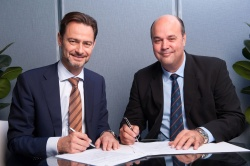The Royal Institute of Chartered Surveyors (RICS) and the South African Institute of Valuers (SAIV) have formalised a long-standing working relationship with the signing of a Memorandum of Understanding (MoU) which will see the two bodies collaborating closely in future.
 The MoU was signed recently by Martin Brühl, president of RICS, and Mark Bakker, president of SAIV.
The MoU was signed recently by Martin Brühl, president of RICS, and Mark Bakker, president of SAIV.The MoU was signed recently by Martin Brühl, president of RICS, and Mark Bakker, president of SAIV.
This is according to TC Chetty, RICS country manager for South Africa, who says as bodies which both have the public interest at heart, both RICS and SAIV promote high professional standards with the aim of building public confidence in the profession and the industry.
“As part of the MoU, the two organisations have agreed to share information such as research, industry standards and market data for mutual benefit. They will also promote one another’s conferences, events and workshops to their memberships, offering member rates to one another,” says Chetty.
“We are honoured to be involved with RICS, which has always been a benchmark of quality,” says Bakker.
“The valuation profession in South Africa has not had as much international exposure and connection until now as SAIV would like, but the formalised relationship with RICS will undoubtedly be beneficial to the profile of the profession. The opportunities for education, information and international collaboration will all benefit members and in turn the public at large."
He says property valuers play an important role in the built environment as valuations are required when immovable property is bought, sold or expropriated, for deceased estates and mortgage bonds, levying of rates, insurance and investment purposes, rental determinations and leases, among others.
A valuer also needs to continually research economic trends and predict future trends when determining the value of a property, says Bakker.
Brühl says the agreement is important for RICS because it views South Africa as a strategic market in Africa.
“What we are doing here, we would like to do elsewhere in Africa: promoting the standards and training professionals, and if they want to become members of RICS, also regulating them.”
RICS has a strong collaborative approach, preferring to engage with professional bodies in various countries to see how common standards and practices can be adopted for the benefit of the industry globally.
Apart from SAIV, RICS currently has collaborative relationships with the SA Council for the Quantity Surveying Profession, Association of South African Quantity Surveyors, SA Property Owners Association, SA Council for the Property Valuers Profession, SA Council for Professional and Technical Surveyors and SA Council for Project and Construction management Professions.
As a large organisation with a presence in 164 countries, over 120 000 qualified members and about another 50 000 aspiring chartered surveyors waiting in the wings to pass their assessment of professional competence, RICS is in a position to play an influential role in this regard.
“We are privileged in that our members feed knowledge and best practice back into RICS, which is valuable input in developing many of the standards. Our main focus is on setting and promoting standards, both with regulators and with the end-users of our services, especially when it comes to valuation,” says Brühl.
He says building market confidence is critical, particularly considering that the financial crisis of 2007/8 was essentially a property-led event.
“One of the privileges that RICS has is that we are a self-regulating body. While in many other countries governments adopt a top-down regulatory approach to industries and professions, we have managed to uphold this privilege for almost 150 years.”
This means a need for self-imposed excellence from all, he says, but it also gives the organisation a unique position in that it is able to connect and collaborate with other bodies across the globe to find ways of working together, developing common standards, codes of practice and even ethics codes.
“We recently initiated, with the encouragement of the World Bank, a coalition of approximately 54 professional bodies which have set the international property measurement standards,” says Brühl.
“This is fundamental for valuers, because if one can measure to a certain standard and then apply international valuation standards to the valuation, this in turn feeds into financial reporting, which is important for creating market stability and market confidence.”
Chetty says working in collaboration with other bodies is something that RICS has taken seriously in recent years, hence the importance of the agreement with the SAIV.
The coalition has also started working on a set of international ethics standards, the need for which is also important in the market. In addition, RICS has just convened the first RICS Global Investment Risk Management Forum, bringing representatives of major investment firms together to discuss issues of risk management.
Brühl says while he aims to build on the work of his predecessors with respect to the standards, collaboration, diversity and inclusion, one of the themes of his presidency is responsible investment.
Bakker says many South African professionals, particularly valuers, have already seen similar benefits in being members of RICS, and the signing of the MoU with SAIV is a further step in making those benefits available to a wider audience.
“Credibility is one of the most important aspects for us. When one of our members signs a report and states on it that they are a member of RICS, it adds an extra level of credibility.”
He says the self-governing aspect is an important one. “In South Africa, the valuation profession is governed by the South African Council of Valuers, but SAIV as a voluntary association is the watchdog for the industry, and for the public interest, which is important to us.”








